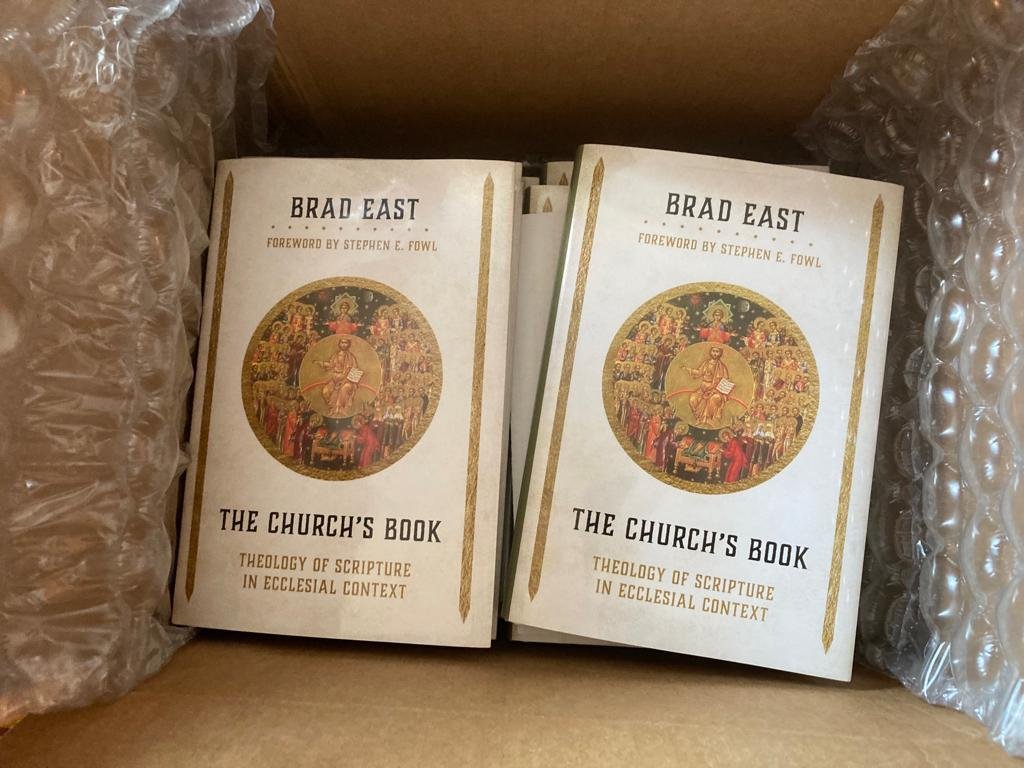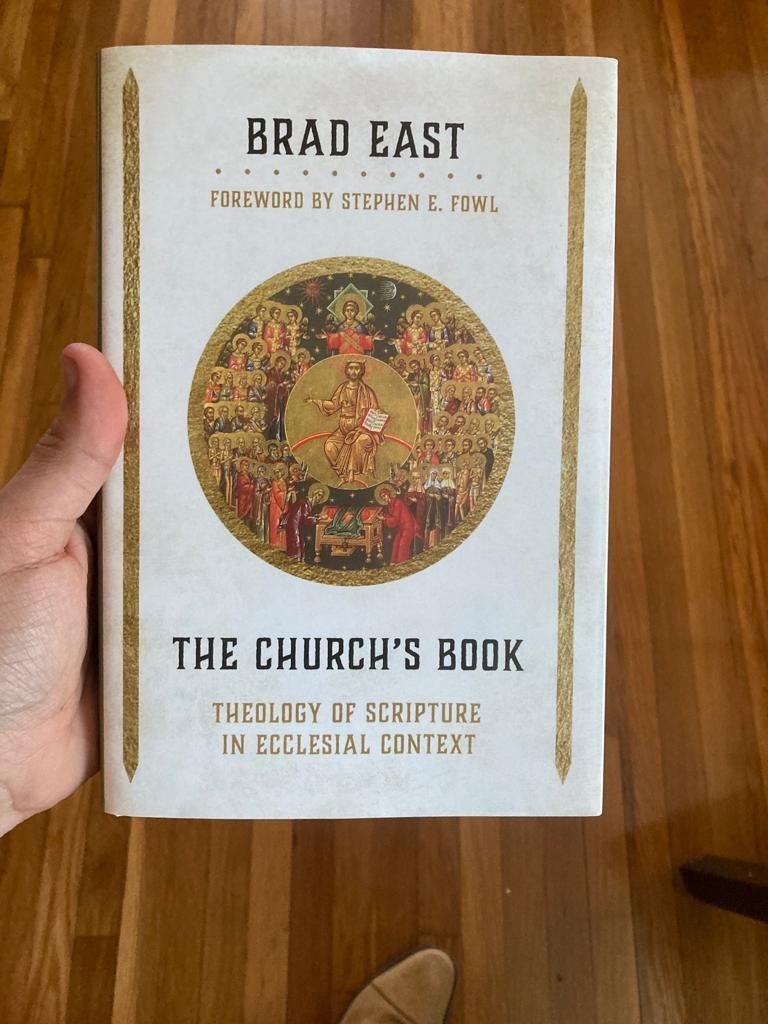The Church’s Book is here!
It’s here!
Or if you want a snazzy wrap-around image of the whole front and back matter…
The book is ready for order anywhere books are sold: Amazon, Bookshop, Eerdmans, elsewhere. Some websites may say that the publication date is May 24, but it’s available to be shipped at this moment—folks I know who pre-ordered it have already received a copy or are getting theirs by mail in a matter of days. And the Kindle edition will be available Tuesday next week, the 26th.
Here’s the book description:
What role do varied understandings of the church play in the doctrine and interpretation of Scripture?
In The Church’s Book, Brad East explores recent accounts of the Bible and its exegesis in modern theology and traces the differences made by divergent, and sometimes opposed, theological accounts of the church. Surveying first the work of Karl Barth, then that of John Webster, Robert Jenson, and John Howard Yoder (following an excursus on interpreting Yoder’s work in light of his abuse), East delineates the distinct understandings of Scripture embedded in the different traditions that these notable scholars represent. In doing so, he offers new insight into the current impasse between Christians in their understandings of Scripture—one determined far less by hermeneutical approaches than by ecclesiological disagreements.
East’s study is especially significant amid the current prominence of the theological interpretation of Scripture, which broadly assumes that the Bible ought to be read in a way that foregrounds confessional convictions and interests. As East discusses in the introduction to his book, that approach to Scripture cannot be separated from questions of ecclesiology—in other words, how we interpret the Bible theologically is dependent upon the context in which we interpret it.
Here are the blurbs:
“How we understand the church determines how we understand Scripture. Brad East grounds this basic claim in a detailed examination of three key heirs of Barthian theology—Robert Jenson, John Webster, and John Howard Yoder. The corresponding threefold typology that results —church as deputy (catholic), church as beneficiary (reformed), and church as vanguard (believers’ church)—offers much more than a description of the ecclesial divides that undergird different views of Scripture. East also presents a sustained and well-argued defense of the catholic position: church precedes canon. At the same time, East’s respectful treatment of each of his theological discussion partners gives the reader a wealth of insight into the various positions. Future discussions about church and canon will turn to The Church’s Book for years to come.”
— Hans Boersma, Nashotah House Theological Seminary“Theologically informed, church-oriented ways of reading Scripture are given wonderfully sustained attention in Brad East’s new book. Focusing on Karl Barth and subsequent theologians influenced by him, East uncovers how differences in the theology of Scripture reflect differences in the understanding of church. Ecclesiology, East shows, has a major unacknowledged influence on remaining controversies among theologians interested in revitalizing theological approaches to Scripture. With this analysis in hand, East pushes the conversation forward, beyond current impasses and in directions that remedy deficiencies in the work of each of the theologians he discusses.”
— Kathryn Tanner, Yale Divinity School“In this clear and lively volume, Brad East provides acute close readings of three theologians—John Webster, Robert W. Jenson, and John Howard Yoder—who have all tied biblical interpretation to a doctrine of the church. Building on their work, he proposes his own take on how the church constitutes the social location of biblical interpretation. In both his analytical work and his constructive case, East makes a major contribution to theological reading of Scripture.”
— Darren Sarisky, Australian Catholic University“If previous generations of students and practitioners of a Protestant Christian doctrine of Holy Scripture looked to books by David Kelsey, Nicholas Wolterstorff, and Kevin Vanhoozer as touchstones, future ones will look back on this book by Brad East as another. But there is no ecclesially partisan polemic here. This book displays an ecumenical vision of Scripture—one acutely incisive in its criticism, minutely attentive in its exposition, and truly catholic and visionary in its constructive proposals. It has the potential to advance theological discussion among dogmaticians, historians of dogma, and guild biblical exegetes alike. It is a deeply insightful treatment of its theme that will shape scholarly—and, more insistently and inspiringly, ecclesial—discussion for many years to come.”
— Wesley Hill, Western Theological Seminary“In the past I’ve argued that determining the right relationship between God, Scripture, and hermeneutics comprises the right preliminary question for systematic theology: its ‘first theology.’ Brad East’s The Church’s Book has convinced me that ecclesiology too belongs in first theology. In weaving his cord of three strands (insights gleaned from a probing analysis of John Webster, Robert Jenson, and John Howard Yoder), East offers not a way out but a nevertheless welcome clarification of where the conflict of biblical interpretations really lies: divergent understandings of the church. This is an important interruption of and contribution to a longstanding conversation about theological prolegomena.”
— Kevin J. Vanhoozer, Trinity Evangelical Divinity School“For some theologians, it is Scripture that must guide any theological description of the church. For others, the church’s doctrines are normative for interpreting Scripture. Consequently, theologians have long tended to talk past one another. With unusual brilliance, clarity, and depth, Brad East has resolved this aporia by arguing that the locus of authority lay originally within the people of God, and thus prior to the development of both doctrine and Scripture. And so it is we, the people of God, who are prior, and who undergird both, and thereby offer the possibility of rapprochement on that basis. East’s proposal is convincing, fresh, and original: a genuinely new treatment that clarifies the real issues and may well prepare for more substantive ecumenical progress, as well as more substantive theologies. This is a necessary book—vital reading for any theologian.”
— Nicholas M. Healy, St. John’s University“All of the discussions in this book display East’s analytical rigor and theological sophistication. As one of the subjects under discussion in this book, I will speak for all of us and say that there are many times East is able to do more for and with our work than we did ourselves. . . . I look forward to seeing how future theological interpreters take these advances and work with them to push theological interpretation in new and promising directions.”
— Stephen E. Fowl, from the foreword
This book has been more than a decade in the making, being a major revision of my doctoral dissertation at Yale. It’s a pleasure and a relief to hold it in my hands. I’m so eager to see what others make of it. I’m especially grateful for it to be coming out so soon after the release last fall of The Doctrine of Scripture, my first book. The two are complementary volumes: one provides scholarly, theoretical, genealogical, and ecclesiological scaffolding; the other builds a constructive proposal on that basis. The sequence of their release reverses the order in which they were written, but that’s neither here nor there. Together, they comprise about 250,000 words on Christian theology of Holy Scripture and its interpretation. Add in my journal articles and you’ve got 300K words. That’s a lot, y’all. I hope a few folks find something worthwhile in them. Always in service to the church and, ultimately, to the glory of God.
What a joy it is to do this job. Very thankful this evening. Blessings.


